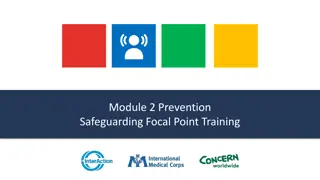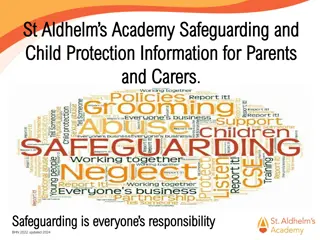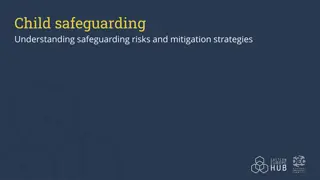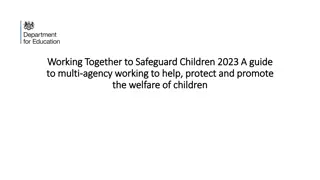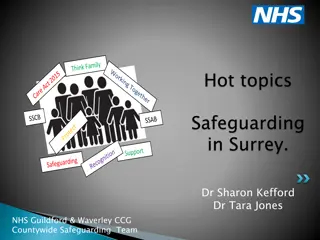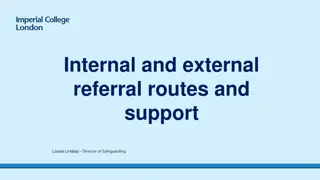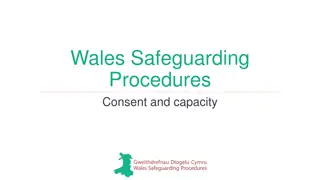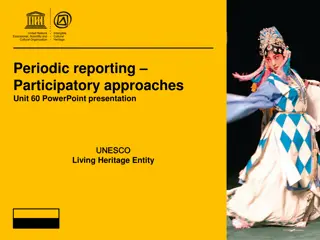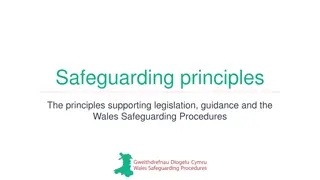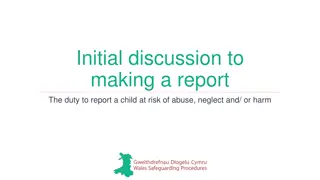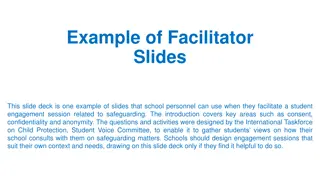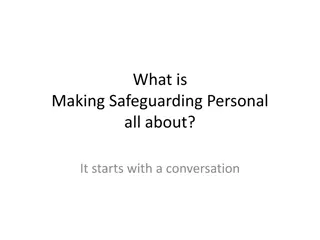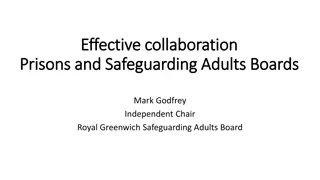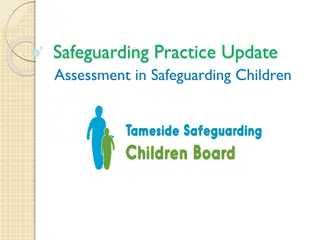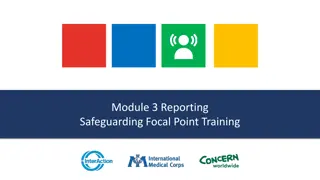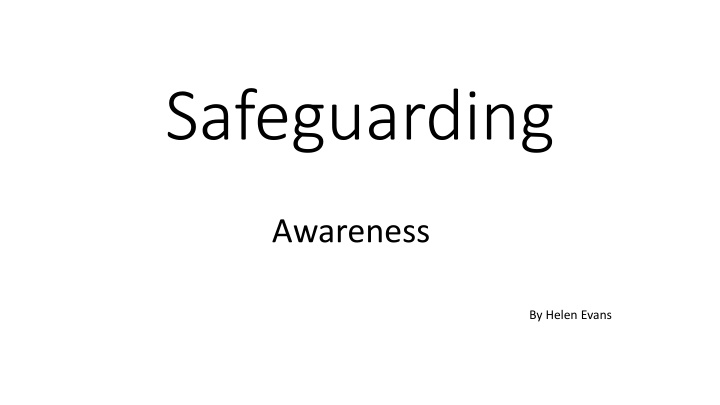
Safeguarding Policies and Procedures at Holy Cross Hospital
Learn about safeguarding practices at Holy Cross Hospital, including key policies, processes, and personnel involved in protecting adults at risk from various forms of abuse. Understand the importance of creating a safe environment for patients and visitors through comprehensive safeguarding measures.
Download Presentation

Please find below an Image/Link to download the presentation.
The content on the website is provided AS IS for your information and personal use only. It may not be sold, licensed, or shared on other websites without obtaining consent from the author. If you encounter any issues during the download, it is possible that the publisher has removed the file from their server.
You are allowed to download the files provided on this website for personal or commercial use, subject to the condition that they are used lawfully. All files are the property of their respective owners.
The content on the website is provided AS IS for your information and personal use only. It may not be sold, licensed, or shared on other websites without obtaining consent from the author.
E N D
Presentation Transcript
Safeguarding Awareness By Helen Evans
Content: Introduction Manual keys points Safeguarding process Who to contact inc. out of hours Discussion and consent form Code of conduct - staff Code of conduct - volunteers
Introduction Safeguarding is about preventing harm and abuse occurring through providing high quality effective care. It is also about our patients experience of care provided and how well they are supported should they be harmed or abused.
Safeguarding policies Can you name the safeguarding policies at HXH? Which cross reference polices might be used when referring to safeguarding? SSAB Surrey Safeguarding Adults Board policy and procedure 2018 Cross reference policies: Accounting for patients money Anti-harassment and victimisation Complaint Consent Disciplinary Equal opportunities and diversity Grievance procedure Notification of events Public disclosure Recruitment Recruitment of sex offenders Restraint Risk management Visiting Protecting and safeguarding adults at risk Safeguarding children Consent Restraint Code of conduct all staff Code of conduct visitors
Protecting and safeguarding adults at risk policy Holy Cross Hospital is strongly committed to defining and implementing practices that protect adults at risk, whether patients or visitors, from abuse, neglect or significant harm or distress. An adult at risk is defined as a person over the age of 18 years: who is in need or may be in need of care services by reason of mental or other disability, age or illness who is unable to take care of him or herself or unable to protect him or herself against significant harm or exploitation. Adults at risk may be victims or perpetrators, or both of abuse
Protecting and safeguarding adults at risk policy continued What types of abuse are there? Can you identify the safeguarding officers? Types of abuse Physical Sexual Psychological Financial or material Neglect or act of omission Discriminatory Self neglect Domestic violence or abuse Modern slavery Organisational or institutional abuse Accountability and responsibility Safeguarding officers: CEO DNS Night sister Confidentiality Recording Staff support and training Disclosure and Baring Service Assessment and intervention
Protecting and safeguarding adults at risk policy continued Procedure to be followed if abuse is suspected Listen, observe, record and report Ensure the adult at risk is safe and receiving appropriate care Preserve evidence Risk assessment A patients own visitor Other patient visitors Potential patients relatives visiting prior to admission Staff Student nurses External carers Volunteers Contractors People hiring the pool or other facilities Sales reps Out patients and those accompanying them CCG or social services representatives Visiting priests or sisters Filing safeguarding incidents Summary kept in the compliments and complaints register
Safeguarding children policy Procedure to be followed if abuse is suspected Disclosure of abuse by a child should always be taken seriously Listen carefully, make observations, document the facts Reassure the child they are being taken seriously and disclosure will be reported to the safeguarding officer Do not question the child Inform NIC immediately. NIC will inform the senior nurse on duty without delay. Senior nurse will inform the safeguarding officer
Consent policy Valid consent is essential to all forms of healthcare delivery from the provision of personal care and non-invasive procedures to invasive interventions including surgery. It is the duty of health professionals undertaking procedures to be confident that the person consents or they are acting in the best interests of the person and therefore proceeding on a lawful basis
Consent policy continued Validity: For consent to be valid the person must: Understand information relevant to the decision Retain the information Weigh up information about different options Have received sufficient information regarding the procedure Not be acting under duress Communicate the decision Capacity Capacity is decision-specific concentrating on the matter related to the decision rather than the ability to make decisions generally. Capacity is time specific focusing on the time the decision is to be made
Consent policy continued Decisions regarding capacity should be guided by the five core principles included in the Mental Capacity Act 2005: Principle 1 - A person must be assumed to have capacity unless he/she have been proven to lack capacity Principle 2 A person is not to be treated as unable to make a decision unless all practicable steps to help him/her do so have been taken Principle 3 A person is not to be treated as unable to make a decision merely because he/she makes an unwise decision Principle 4 An act done or decision made under this Act for or on behalf of a person who lacks capacity must be done or made in his/her best interests Principle 5 Before the act is done or the decision made, regard must be given to whether the purpose for which it is needed can be as effectively achieved in a way that is less restrictive of the person s rights and freedom of action
Consent policy continued Best interests One of the key principles of the Mental Capacity Act 2005 is that any decision made on a person s behalf is in their best interests. The Act requires steps to be followed to determine what is in someone s best interests When to seek consent Provision of information Documentation Responsibility for seeking consent Refusal of treatment Second opinions and court proceedings Clinical photography and video recordings
Restraint policy The application of restraint at Holy Cross Hospital is used as a last resort for the sole purpose of ensuring the safety and wellbeing of a patient. When deciding to use restraint the clinical team must assess why restraint is necessary and monitor its use carefully. Restraint should only be used when other methods of therapeutic behaviour management have been unsuccessful. The decision to use restraint must be discussed with the patient (if competent) and their close family, fully documented and reviewed regularly Every person (not subject to legal detention) has the right to be free from restrictions to his or her speech or movement. Restraint therefore could be described as a breach of a person s fundamental human rights, although there may be circumstances where other considerations override this
Restraint policy Continued There is no legal definition of the term restraint . It can be described as an intervention that prevents a person from behaving in ways that threaten or cause harm to themselves, others or property (Duff et al 1996). A further description is any device, material or equipment attached to or near a person s body and which cannot be controlled or easily removed by the person and which deliberately prevents or is deliberately intended to prevent a person s free body movement to a position of choice and/or a person s access to their body
Restraint policy continued METHODS OF RESTRAINT Restraint can be overt and deliberate or discreet or even accidental. Everyday equipment and routine practices could in some circumstances be regarded as restraint therefore understanding the motives behind the restraint is critical. Methods of restraint may include: Bed rails Hammocks or cocoon beds Bed height that is too high or too low Inappropriate use of wheelchair safety straps (lap or head) Reclining chairs or other chairs where the construction immobilises the patient Arrangement of furniture which prevents movement Use of beanbags for seating Harnesses Locked doors Coded locks Stair gates Removal of sensory aids e.g. spectacles Removal of outdoor shoes and/or walking aids Physical holds Inappropriate use of sheets etc. Inappropriate use of night clothes during the day Isolation Electronic tagging Medication Camera surveillance Can you name some methods of restraint?
Safeguarding process what to do and what happens What should you do if you see or suspect abuse? Who would you inform? Who would you contact out of hours? What would you do in an emergency? What is M.A.S.H?
Who to contact Where might you find information on who to contact? Can you remember who the safeguarding officers are?
Safeguarding Code of Conduct All Staff This code sets out standards of behaviour expected from staff when dealing with vulnerable adults and/or children. Although children are not treated at Holy Cross Hospital they are allowed to visit so it is important to ensure they are safe and feel comfortable during the time they are on the premises A vulnerable adult may be a patient or a visitor
Safeguarding Code of Conduct All Staff Continued Staff must: Staff must not: Spend excessive amounts of time alone with vulnerable adults or visiting children away from others Make any unnecessary physical contact with vulnerable adults or visiting children (it is recognised that physical contact with patients is a necessary part of the work of caring for them) Do things of a personal nature to a vulnerable adult or visiting child if they can do it themselves Initiate or engage in conversations or activities that could be interpreted as sexually provocative Use or allow the use of inappropriate language to go unchallenged Show favouritism to any one vulnerable adult or visiting child Threaten any form of punishment Meet vulnerable adults outside of the workplace Trivialise or exaggerate any potential vulnerable adult or child abuse issues Allow any allegations made by a vulnerable adult or visiting child to go without being reported and addressed Make promises to keep any disclosures confidential to relevant authorities Start an investigation or question anyone after an allegation or concern has been raised. The facts should be recorded and reported to the Safeguarding Officer Respect patients right to privacy Encourage vulnerable adults and/or visiting children to report attitudes or behaviour they do not like Make sure communication with vulnerable adults and children is clear and not open to misinterpretation Act with discretion with regards to personal relationships and ensure personal relationships do not affect their role in the hospital Declare any pre-existing relationships with a vulnerable adult, visiting child or family member Inform their line manager if they find themselves the subject of inappropriate affection or attention from a vulnerable adult, a family member or a visiting child Be aware of procedures for reporting concerns or incidents relating the welfare of a vulnerable adult or visiting child including concerns about the actions or behaviour of another member of staff or concerns based on a conversation with a patient or visiting child Participate in safeguarding training every year at level 1 for all staff, and clinical staff level 1 and level 2 yearly, with enhanced safeguarding for clinical professionals every 2 years or as instructed by the Safeguarding lead Visiting policy Public interests disclosure (Whistle blowing) policy Learning and development plan
Safeguarding Code of Conduct - Volunteers This code sets out standards of behaviour expected from volunteers when dealing with vulnerable adults and/or children Although children are not treated at Holy Cross Hospital they are allowed to visit so it is important to ensure they are safe during the time they or on the premises A vulnerable adult may be a patient or a visitor
Safeguarding Code of Conduct - Volunteers Volunteers must: Volunteers must not: Respect patients right to privacy Encourage vulnerable adults and/or visiting children to report attitudes or behaviour they do not like Act with discretion with regards to personal relationships and ensure personal relationships do not affect their role in the hospital Declare any pre-existing relationships with a vulnerable adult or family member Inform the Social Activities Co-ordinator or Director of Clinical Services if they find they are the subject of inappropriate affection or attention from a vulnerable adult, a family member or a visiting child Be aware of procedures for reporting concerns or incidents relating the welfare of a vulnerable adult or visiting child including concerns about the actions or behaviour of another member of staff or concerns based on a conversation with a patient or visiting child Participate in safeguarding training every 3 years Visiting policy Public interests disclosure (Whistle blowing) policy Spend excessive amounts of time alone with vulnerable adults or visiting children away from others Make any unnecessary physical contact with vulnerable adults or visiting children Do things of a personal nature to a vulnerable adult or visiting child if they can do it themselves Initiate or engage in conversations or activities that could be interpreted as sexually provocative Use or allow the use of inappropriate language to go unchallenged Show favouritism to any one vulnerable adult or visiting child Threaten any form of punishment Meet vulnerable adults outside of the workplace Trivialise or exaggerate any potential vulnerable adult or child abuse issues Allow any allegations made by a vulnerable adult or visiting child to go without being reported and addressed Make promises to keep any disclosures confidential to relevant authorities Start an investigation or question anyone after an allegation or concern has been raised. The facts should be recorded and reported to the Social Activities Co-ordinator or Director of Clinical Services
Thank you for Listening Any questions?

